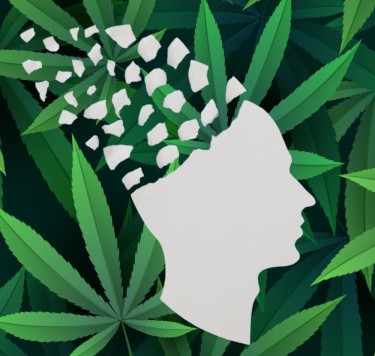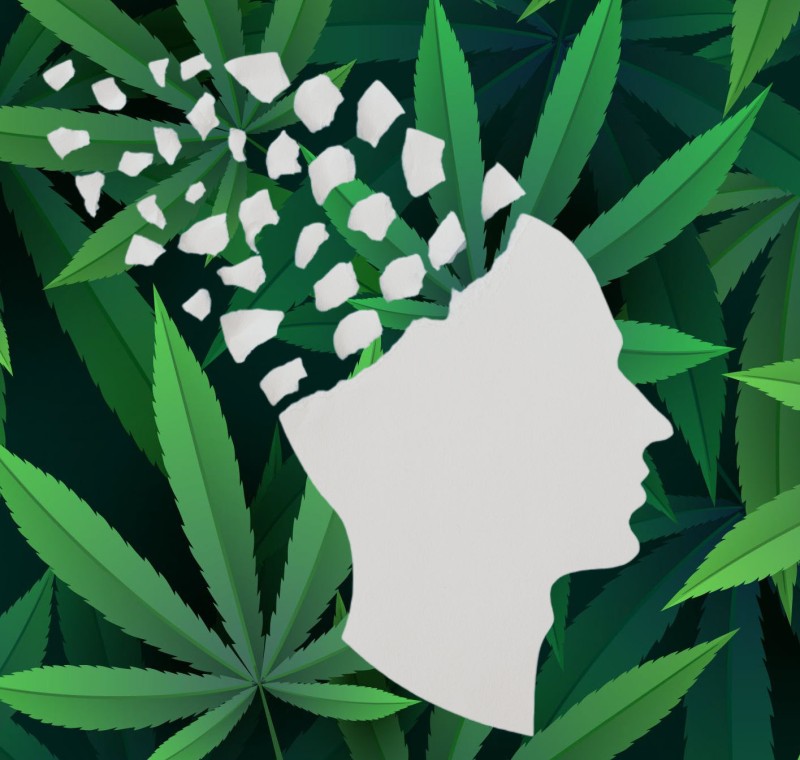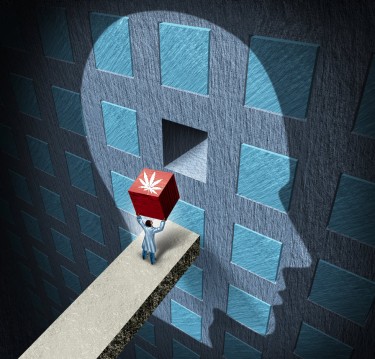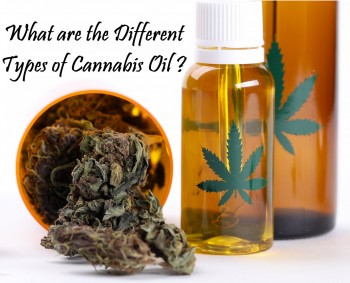
As a seasoned psychonautical explorer sampling earth's cornucopia of altered states, I can assure concerned minds that cannabis ranks among the mildest mood modifiers found growing freely. While offering unique dimensions of consciousness absolutely meriting respect, its cognitive influence barely ripples the pond compared to other avenues.
Sure, a large oral dose of the top-shelf may remove one temporarily from linear processing into swirling impressionistic headspaces. But such psychic swimming remains shallow splashing next to the alien oceanic depths and rocketing velocities possible with other herbs and chemicals.
A two-hit Hoffman bicycle ride or DMT depersonalization contain scarcely comparable psychenautic gravity. Their transcendent peak experiential bandwidths blast through subjective infinity, suspending all constructs of space, time and identity in magmatic hydrogen bliss. Good luck solving math puzzles mid-hyperspace! Or perhaps, you’d experience math in a completely new dimension, unlocking things you’ve never thought of before.
Good ‘ol drug induced neuroplasticity!
Even sniffing mounds of powdered ambition to all-night cocaine ramblings court more serious cerebral dysfunction. Such compulsive dopamine hijacking frequently fuels delusional ideations of grandeur and paranoid psychosis once sleep deprivation kicks in.
Compare these adventures to the friendly confines of some Blue Dream body buzz, tuning sensory acuity towards laughter, dancing and connection. Traversing these playful marijuana meadows around others often heightens communal intuition and camaraderie, not deterioration measuring anywhere near other intoxicant continents.
So while scientific due diligence confirming such relative safety is prudent given reefer madness stigma, let's retain perspective. Joint-induced "impairment" rates barely a blip for psychonauts measuring cognitive impacts across vaster pharmacopeias. If anything, cannabis comedowns serve as gentler integration terrain after returning from more turbulent travels beyond infinity's event horizons. The mellow plant provides solid landing gear grounding wanderers back on Earth.
Now that we've established some crucial context, let's explore what researchers discovered examining prescribed cannabis influences on cognition and consciousness more closely...
Recent Findings Down Under
An Australian study aimed to assess potential cognitive impacts among 40 patients self-administering their prescribed medicinal cannabis products. Researchers monitored effects using both the sophisticated Cambridge Neuropsychological Test Automated Battery (CANTAB) alongside a mobile application called Druid.
I actually interviewed Dr. Thomas Arkell, Druid's creator, when it launched several years ago. His technology quantifies psychomotor functioning through brief interactive tests on reaction time, balance, divided attention, and inhibition control. This provides an efficient biomarker for subtle neurological impairment from any substance or condition.
Patients in the cannabis study represented demographics commonly prescribed medicinal marijuana - mostly middle aged, many treating chronic pain and sleep disorders. They orally self-dosed oils or inhaled flower per packaged directions then performed multiple CANTAB and Druid cognitive evaluations both before and after consumption.
Intriguingly, rather than decrementing over time as expected, subjects actually improved on certain attention and information processing CANTAB metrics. Their Druid scores exhibited no significant variation either. These counterintuitive findings starkly contradict assumptions that cannabis, even medicinal, impedes cognition.
By contrast, subjects did report feeling progressively more "stoned" and "sedated" on self-assessment scales in the hours after dosing. Those vaping flower containing higher THC described intensified intoxication relative to oil users.
Yet despite acknowledging these subjective drug effects, users demonstrated no corresponding cognitive difficulties - essentially feeling impaired without actual performance relevance.
This substantiates why medicinal cannabis patients describe quality of life improvements and continue accessing marijuana despite claims of risks - it effectively alleviates symptoms without hampering daily mental faculties, especially under doctor supervision optimizing dosage.
The knowledge accords with psychonautic precedents differentiating cannabis from substances like alcohol truly sabotaging cognition temporarily in proportion to intoxication felt. Weed exerts much subtler headspace modulation unlikely disturbing functionality applied judiciously.
But how could detectable psychological influence not seemingly translate into mental performance detriments as commonly assumed? Let's unravel that fascinating discrepancy next...
When Non-Users Make Rules And Research
A key quandary permeates cannabis cognitive research - those directing studies and policies frequently possess little firsthand psychoactive reference beyond alcohol, the most socially condoned intoxicant. Hence they transfer expectations colored by booze and prohibitionist rhetoric onto analyzing weed. But applying frameworks contrived around vastly dissimilar substances courts confusion.
Because alcohol notoriously ravages critical thinking and control centers at high doses, it makes intuitive sense why lawmakers prohibit operating vehicles or machinery while drunk. Impairment directly and proportionately tracks intoxication felt - the drunker one gets, the more cognition suffers acutely.
So examining cannabis through this lens of familiar behavioral dysfunction, it seems reasonable assuming comparable or even exceeding mental retardation from illicit substances. Especially when long classified as dangerously as heroin simply for psychoactivity.
However, extrapolating thusly overlooks a glaring experiential reality: cannabis influencing cognition bears only crude resemblance to being drunk despite some conceptual overlap. Beyond surface similarities, their neurological mechanisms differ enormously.
Unlike depressants numbing executive function in a dose-dependent manner, cannabis modulates perception more subtly without necessarily compromising reasoning capacity directly.peak psychoactivity still allows clear mental command rather than blackout.
So why the discrepancy from assumptions? Mostly because cannabis intoxication functions unlike alcohol incritical ways - users typically retain lucid memory, comprehension, judgment and behavior control within reasonable levels of use. Only edible overdoses generate comparable dissolution.
This means despite altered headspaces, tasks like driving remain largely executable with modest effort for seasoned consumers. Now novice users or highly potent products do require caution. But blanket equivalence to drunkenness proves unfounded underexamination.
Where alcohol hits login out central circuits in a blunt diffuse manner, cannabis more delicately tweaks consciousness through targeted receptor systems absent shutting higher function down. Drunk causes mechanical failure, stoned taps light switches.
So research crafted by the sober around legal intoxicants frames cannabis effects incorrectly through confirmation bias. Medicine examines molecules, not platitudes. And the molecules reveal a nuanced synchronist herb unlikely cognitively crippling except under special conditions.
Why Medical Cannabis Users Feel Effects Differently
If cannabis intoxication only modestly disrupts cognition in recreational contexts, this effect further diminishes in medical settings. This makes sense considering marijuana's therapeutic attributes arise from dynamic interaction between phytocannabinoids and the human endocannabinoid system.
As receptors modulate platforms balancing vital functions like appetite, pain relief, or sleep cycles, introducing cannabis compounds triggers self-localized activity stabilizing physiological rhythms. It essentially amplifies innate biochemical feedback mechanisms.
So unlike drinking alcohol passively overwhelmed by binding agents blindly depressing central nervous function, medical cannabis activates targeted endogenous infrastructure for tailored symptom management. Rather than numbing organs, it enhances their self-regulatory capacity.
This means patients utilizing cannabis as medicine often feel reduced or nuanced effects relative to recreational counterparts using equal doses without underlying medical necessity. Their bodies immediately redistribute and metabolize compounds directly toward addressing diagnosed deficiencies or inflammation.
While some generalized psychoactivity occurs peripherally, the bulk of cannabis chemistry works immediately alongside internal infrastructure at directed sites instead of indirectly swamping global neurotransmission crudely like booze. Precision balanced synergism transpires rather than blunt toxic overload.
In essence then, an intelligent two-way dialogue manifests between organism and ally herb parsed through critical pathways in real time. This allows self-government and homeostasis to strengthen, not erode underSupported exterior influence.
So unlike drinking's unilateral domination of faculties through concentration gradients depleting control centers, medical cannabis employs measured bidirectional communication refined over eons of co-evolution. The rapport ripens medicine.
Thus patients note feeling more functional relief and wellbeing with less attention drawn to the plant's secondary cognitive spice. They often describe a sensation of clouds or cobwebs clearing rather than obscured. Clarity and vitality improves together through mutually understood exchange.
This clinical efficiency and bio-affinity is why cannabis makes potentially ideal, uniquely tuned medicine if applied conscientiously. It interfaces so naturally with our ancient mammalian physiology, echoing delicate biochemical feedback conversations. Harnessing that bond taps profound curative resonance.
No blunt symptomatic substances can compare.
The Sticky Bottom Line
These clinical insights substantiate what underground medicine knew through hard experience and ancient shamanic lineages transmitted regarding cannabis - it is no blunt intoxicant but rather profound ally if respected appropriately.
Beyond superb symptom treatment absent notable cognitive disruption, the plant provides gentle psychoactive initiation opening doors of perception and intuitive states attuning us to deeper aspects of condition rarely addressed in conventional practice.
Where pharmaceuticals excel at brute chemical force intervention aimed narrowly at localized disease and dysfunction, whole plants synergize broadly across dimensions. Their active compounds choreograph multidimensional healing through interdependent workings refined over eons of co-evolution. They encapsulate enduring wisdom.
So cannabis and other organic medicines don't simply suppress pathology but nurture the organism holistically - elevating moods, tuning energies, aligning psyche and soma into harmonic coherence once more through biochemistries we intuitively comprehend. They activate the healer within through rapport.
This explains the ineffable spirit people describe undergoing transcendent sessions even secularly - sincere experience meeting conscious plant teacher dispensing hard-won lessons through gnosis and empathy. Beyond compound and container dwells personality animating effect. High science has yet to acknowledge this soul.
But beyond mysticism rests potent neuromodulation clinically confirmable if conservatively translated. Because unlike arbitrarily patented pharmaceutical isolates blindly manipulating single targets in biochemical space, cannabis harmonizes myriad metabolic riffs into a symphonic crescendo aligning selfhood. It coaxes wholeness.
If institutional medicine desires understanding this dynamic herb's exact risk profiles and therapeutic utilities, it must widen narrow chemistry perimeters acknowledging cannabis' simultaneous material and ineffable natures. Otherwise, half the medicine remains discounted and denied by default.
So can our brightest intellects progress interpreting shamanic truths while gently reintegrating intuitive ways of knowledge into sterile mechanistic frameworks? The gauntlet is thrown as this kind yet formidable plant teacher offers ascension of thought and healing if we cultivate courage facing profound identity beyond atomistic bits.






